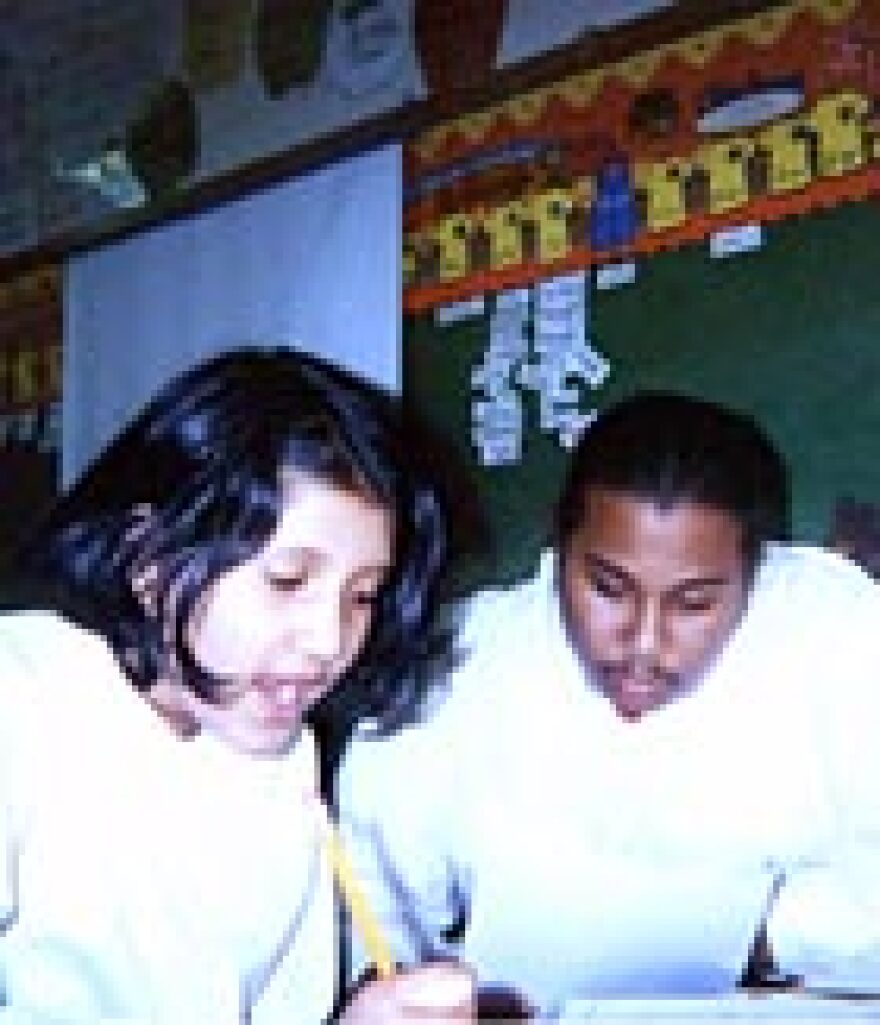

Today's teenagers have grown up with two strong messages about government: that politics is messy and politicians can be corrupt, and that every citizen can make a difference in his or her community.
Research shows that the average 20-year-old is more likely to sign up as a volunteer than show up at the voting booth. In its "Citizen Student" series, Morning Edition is reporting on how young people learn about citizenship. Many of them volunteer because their schools require it. NPR's Nancy Solomon reports that many programs encourage students to reach out beyond their classrooms. But some experts worry the programs are sending an incomplete message about citizenship.
At Princeton High School in New Jersey, senior Miranda Robertson occasionally skips her daily ballet class to volunteer in the community. NPR caught up with her as she worked in the Crisis Ministry in Trenton. She began volunteering her sophomore year, when all Princeton students are required to do 50 hours of community service. She and many of her peers continue to volunteer throughout high school, they say, because it gives them a sense of accomplishment.
But when Robertson and other students talk about community service, something is curiously absent, Solomon reports. They never suggest the experiences have made them want to get involved in creating government solutions to the problems they see.
"Yes, we can definitely help our community, in maybe small ways," Robertson says. But she questions whether she and other young people can get involved in effecting political changes.
Robertson and her peers are in the middle of a national debate about how best to teach kids about citizenship. Although most public high schools offer or require volunteering, few teach about the broader problems their students are trying to address, Solomon reports.
For example, the schools organize parties for kids at a local homeless shelter, without any discussion of the affordable housing shortage. They feed the hungry, without learning why some people can't afford to eat. The absence of these lessons may undermine the very goals of volunteer programs, some researchers say.
"My worry is that as good as a lot of the service learning work is, that it not only doesn't encourage political involvement and policy involvement, but it may in fact even discourage it," says Michael Delli Carpini, a political scientist at the Pew Charitable Trusts.
Delli Carpini says young Americans are "not apathetic" as they're sometimes portrayed. "They are very much concerned about public life and contributing to it," he says. "But they believe politics is not the most effective way for them to do it. They see government as ineffective and they see volunteerism as the most tangible immediate way in which to see the effects of the work that they do."
At North Penn High School in the Philadelphia suburbs, civics teacher David Hall oversees a semester-long project that introduces students to political action. Rather than focusing solely on volunteer work, students pick a problem in their community, come up with proposals for change, and then present their ideas to a visiting panel of community leaders. In one project, to address the high cost of college tuition, some of Hall's students suggested raising taxes on alcohol, cigarettes and gambling.
Seniors Karly Kukish, Jennifer Wright and Stephanie Morello say the real-life issues raised in the class have made them more interested in participating in voting and the political process.
Another program goes further, getting students outside the classroom to see worlds they would never encounter, Solomon reports. At University City High School in Philadelphia, students in a sophomore horticulture class cross the street each week to tutor kids in an elementary school that has too many kids and not enough money.
Program coordinator Martin Galvin says the tutoring benefits the teenagers just as much as the elementary school kids. "You're saying to 15- and 16-year-olds that we believe you're capable of going over into a classroom, delivering that lesson plan, and having smaller students learn (from) you," he says. "That's an incredibly powerful message."
Copyright 2022 NPR. To see more, visit https://www.npr.org.



